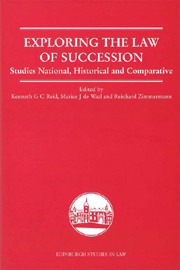Book contents
- Frontmatter
- Contents
- Preface
- List of Contributors
- List of Abbreviations
- Table of Cases
- 1 A Comparative Overview
- 2 Compulsory Heirship in Roman Law
- 3 Succession Law in Scotland – a Historical Perspective
- 4 Succession Law in South Africa – a Historical Perspective
- 5 Freedom of Testation and the Ageing Testator
- 6 Testamentary Conditions and Public Policy
- 7 Forfeiture Clauses and Events in Scots Law
- 8 Revocation of Wills by Changed Circumstances
- 9 Fideicommissary Substitutions: Scots Law in Historical and Comparative Perspective
- 10 The conditio si institutus sine liberis decesserit in Scots and South African Law
- 11 The New Dutch Law of Succession
- 12 Revocability of Mutual Wills
- 13 Succession Agreements in South African and Scots Law
- Index
5 - Freedom of Testation and the Ageing Testator
Published online by Cambridge University Press: 12 September 2012
- Frontmatter
- Contents
- Preface
- List of Contributors
- List of Abbreviations
- Table of Cases
- 1 A Comparative Overview
- 2 Compulsory Heirship in Roman Law
- 3 Succession Law in Scotland – a Historical Perspective
- 4 Succession Law in South Africa – a Historical Perspective
- 5 Freedom of Testation and the Ageing Testator
- 6 Testamentary Conditions and Public Policy
- 7 Forfeiture Clauses and Events in Scots Law
- 8 Revocation of Wills by Changed Circumstances
- 9 Fideicommissary Substitutions: Scots Law in Historical and Comparative Perspective
- 10 The conditio si institutus sine liberis decesserit in Scots and South African Law
- 11 The New Dutch Law of Succession
- 12 Revocability of Mutual Wills
- 13 Succession Agreements in South African and Scots Law
- Index
Summary
INTRODUCTION
In Roman law, there was universal acceptance of the principle embedded in the maxim testamentum est voluntatis nostrae iusta sententia, de eo quod quis post mortem suam fieri velit. This presupposed that a person's legally-recognised last wishes would be honoured after his death even although he himself was no longer there to enforce them. There is, however, little discussion in the Roman texts from which the reason for this honouring of the last will can be ascertained, and even in modern times most lawyers seem to accept without a second thought that the last will of the deceased should be adhered to.
Of course, during his lifetime it is accepted that an owner may exercise the entitlements encompassed in ownership (i.e. the ius utendi, fruendi et abutendi). He may, for instance, abandon his assets or donate them to the church. He may of his own free will decide to dump his old washing machine at the municipal dump, or even put his Picasso painting in the dustbin. The value of the property does not affect the legality of the action. The mere unilateral act of abandonment is sufficient to render the previously-owned object a res derelictus. In South African and Roman-Dutch law, it is impossible to abandon an asset for the benefit of another person. By contrast to the ill-defined notions from English or other Common Law systems, it is, for example, impossible for a person whose car has been stolen to abandon the car to the insurance company in exchange for the insurance payment.
- Type
- Chapter
- Information
- Exploring the Law of SuccessionStudies National Historical and Comparative, pp. 78 - 98Publisher: Edinburgh University PressPrint publication year: 2007



